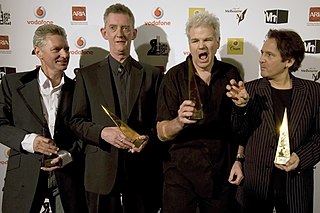
Dragon are a New Zealand rock band which was formed in Auckland in January 1972, and, from 1975, based in Sydney, New South Wales, Australia. The band was originally fronted by singer Graeme Collins, but rose to fame with singer Marc Hunter and is currently led by his brother, bass player and vocalist Todd Hunter. The group performed, and released material, under the name Hunter in Europe and the United States during 1987.
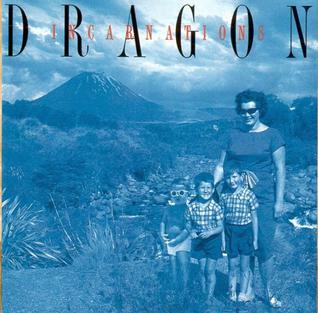
Incarnations is the tenth studio album by New Zealand-Australian band, Dragon. The album was released in 1995. and is an acoustic album of their previously released material. It was their final studio album for eleven years, their last before their second split in 1997 and their last to feature Marc Hunter before his death in 1998.
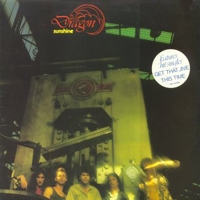
Sunshine is the third studio album by New Zealand rock band Dragon, it was their first album after they had relocated to Sydney, Australia in May 1975. Sunshine was released in February 1977 by CBS Records and peaked at #24 on the Australian national albums charts. The album was certified gold. The single "This Time" had been released in late June 1976, which peaked at #26 on the Australian national singles charts. The second single "Get that Jive" was the best charting peaking at #13 and the third single "Sunshine" reached #36. The album had US and International releases in 1978 on Portrait Records, with "This Time" called "In the Right Direction" and an alternative cover used.

O Zambezi is the fifth studio album by New Zealand rock band, Dragon. It was produced by Peter Dawkins and was released in September 1978 on vinyl and re-released on CD in 1988. The album peaked at number 3 on the Australian Kent Music Report which remains the band's highest charting album in that country. The album was certified platinum in Australia.

Snake Eyes on the Paradise Greatest Hits 1976–1989 is a compilation album by rock music group, Dragon, released in 1998. This is the single disc version - there is also a two-disc version called Tales from the Dark Side Greatest Hits and Choice Collectables 1974–1997, which has this disc plus a second disc of album tracks, live, b-sides and other rarities. The album charted at number 70 on the ARIA Charts.

Tales from the Dark Side Greatest Hits and Classic Collectables 1974-1997 is a compilation album by rock music group, Dragon, released in August 1998. Disc one has the same track listing as Snake Eyes on the Paradise Greatest Hits 1976–1989, which was issued in the same year. Disc two consists of album tracks, live, b-sides and other rarities.

Dreams of Ordinary Men is the eighth studio album recorded by Australian-New Zealand rock band Dragon. The album was released in August 1986 and peaked at number 18 on the Australian Kent Music Report and was certified platinum in November 1986.

"Get That Jive" is a song by Australian–New Zealand band Dragon released in March 1977 as the second single from the band's third studio album, Sunshine (1977). "Get That Jive" peaked at No. 13 on the Australian Kent Music Report. It was the first of the group's singles to feature drummer Kerry Jacobson.

"Rain" is a song by New Zealand rock group Dragon released in July 1983 as the first single ahead of their seventh studio album, Body and the Beat. It is co-written by the group's brothers, Marc and Todd Hunter, with Johanna Pigott, Todd's then-domestic partner. "Rain" peaked at number 2 and stayed in the Kent Music Report singles chart for 26 weeks. The song reached number 88 on the United States Billboard Hot 100 charts in mid-1984. For the original single version the group's Kerry Jacobson had provided drums and percussion; he left the group in September 1983 and was replaced by Terry Chambers, who is shown in promotional material including cover art and music videos.

Dragon's Greatest Hits Volume 1 is the first greatest hits album by New Zealand group Dragon, released in April 1979 through CBS Records. It includes tracks from the band's three CBS/Portrait albums, Sunshine, Running Free and O Zambezi, as well as three non-album tracks; "Wait Until Tomorrow", "Konkaroo" and "The Dreaded Moroczy Bind". Dragon's Greatest Hits Vol. 1 peaked at number 8 on the Australian Kent Music Report.
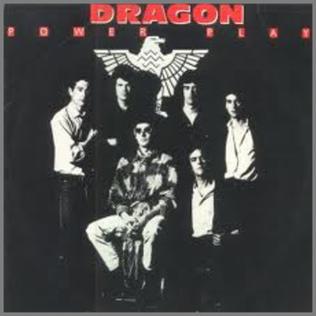
Power Play is the sixth studio album recorded by Australian-New Zealand group Dragon, released in September 1979. It was the group's first album without their iconic singer Marc Hunter although arguably it was the lack of support from the group's label, rather than a decline in quality of the group's output, that accounted for its poor commercial performance: Power Play peaked at number 64 on the Australian Kent Music Report. It was the group's final studio album for five years; they split up in December 1979. Unlike other Dragon albums from the 1970s, it has not been reissued on CD, except as a bootleg; notwithstanding that Dragon in its current form has been playing for over a decade with Mark Williams as singer, Power Play appears to be regarded as 'non-canon' amongst the group's records.

"Shooting Stars" is a song by New Zealand band Dragon, released in January 1978 as the second and final single to be released from Dragon's fourth studio album, Running Free (1977).
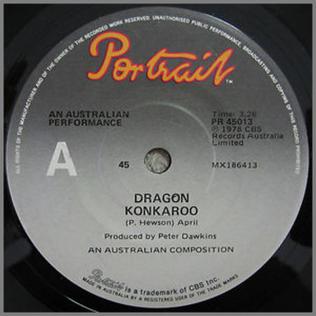
"Konkaroo" is a song by New Zealand band Dragon, released in April 1978. A non-album single, it was included on the group's first greatest hits, Dragon's Greatest Hits Vol. 1 in 1979. The b-side, "Mr. Thunder", appears on the group's fourth album Running Free. The single did not chart.

"Cry" is a song by New Zealand-Australian rock band Dragon released in May 1984 as the third single from the group's seventh studio album Body and the Beat (1984). The song peaked at number 17 on the Australian Kent Music Report.
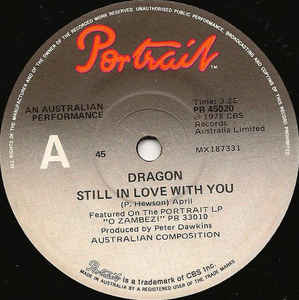
"Still in Love with You" is a song by then Australian-based New Zealand rock band Dragon, released in October 1978 as the second and final single to be released from the band's fifth studio album O Zambezi (1978).

Live One is the first live album by Australian-New Zealand rock band Dragon. The album was recorded on 10 August 1984 at the Sydney Entertainment Centre during the promotion of the Body and the Beat album. Live One was released in June 1985 and peaked at number 62 on the Australian Kent Music Report.

"Love's Not Enough" is a song by New Zealand band Dragon, released in April 1979 as a non-album single, but later to appear on the compilation album Snake Eyes on the Paradise Greatest Hits 1976–1989. The single charted at number 37 on the Australian Kent Music Report. It was the group's first release without Marc Hunter; he had been replaced by Billy Rogers and Richard Lee. Lee had played on a previous Dragon single, "Are you Old Enough". "Love's Not Enough" had been popular in Dragon's live repertoire prior to Hunter's departure. The b-side of the single, "Four Short Solos" was contrived to give drummer Kerry Jacobson and new members Rogers and Lee some songwriting royalties on a release that the group expected would be a major hit.
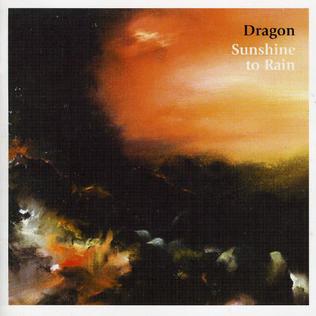
Sunshine to Rain is the eleventh studio album by New Zealand-Australian band, Dragon. The band reformed featuring Mark Williams on vocals. The album was released on 27 June 2006 and is their first since 1995's Incarnations. The album debuted and peaked at number 87 on the ARIA Charts. The album release was followed with a tour.

So Far is a compilation album by New Zealand group Dragon, released in January 1988 through J&B Records, under licence from CBS Records and PolyGram Records. The album was released as the band's cover version of Kool & The Gang's "Celebration" was in the top 20 in Australia, on the RCA Records label.

Cuts from the Tough Times is a compilation album by New Zealand group Dragon, released in January 1990 through Polydor Records. The album comprised all the tracks from their 1984 album, "Body and the Beat" and a selection of tracks from their 1986 album, "Dreams of Ordinary Men". The album has been re-released numerous times.




















